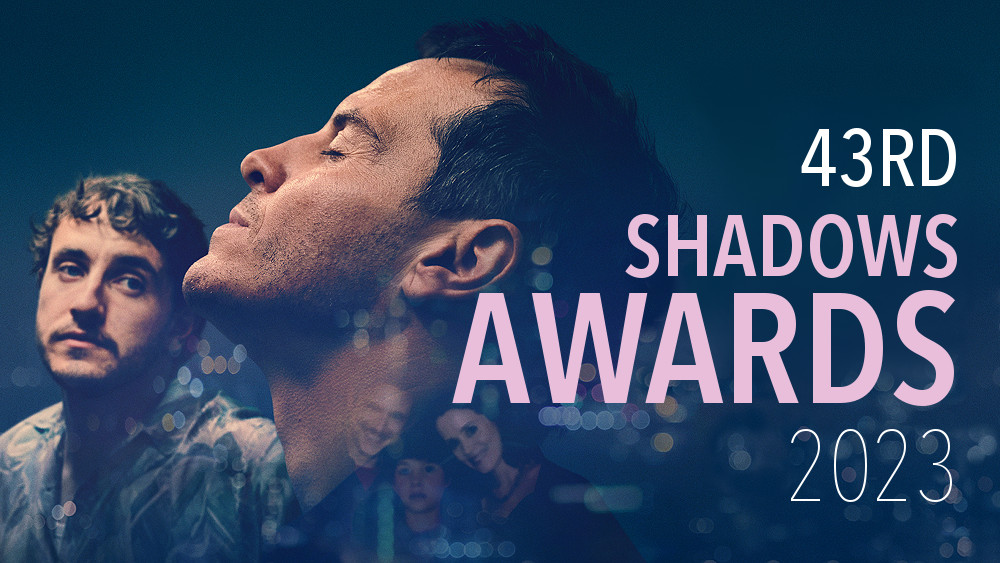| SHADOWS ON THE WALL | REVIEWS | NEWS | FESTIVAL | AWARDS | Q&A | ABOUT | TALKBACK | |||||
 Shadows off the beaten path Shadows off the beaten pathIndies, foreign, docs and shorts...
On this page:
JOYLAND |
MORE THAN EVER |
THE SUBSTITUTE
| |||||
| See also: SHADOWS FILM FESTIVAL | Last update 18.Jan.23 | |||||
|
Joyland Review by Rich Cline |  MUST
MUST  SEE SEE
| |||||
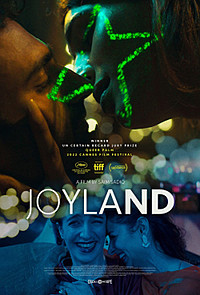 dir-scr Saim Sadiq prd Apoorva Guru Charan, Sarmad Sultan Khoosat, Lauren Mann with Ali Junejo, Rasti Farooq, Alina Khan, Sarwat Gilani, Salmaan Peerzada, Sohail Sameer, Sania Saeed, Ramiz Law, Honey Albela, Priya Usman Khan, Shahbaz Rafiq, Iftikhar India release Pak 18.Nov.22, US Nov.22 afi, UK 24.Feb.23 22/Pakistan 2h06
CANNES FILM FEST TORONTO FILM FEST  Is it streaming? |
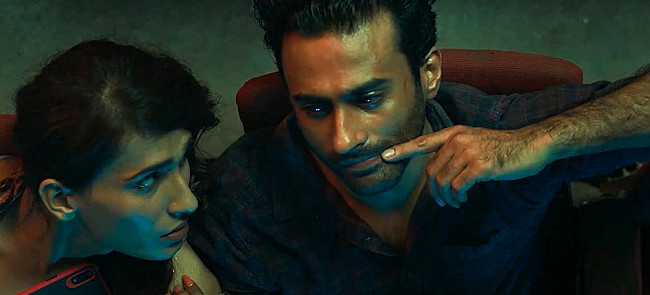 Bristling with real-life energy, this drama from Pakistan is beautifully observed, depicting realistic characters who are hugely engaging. While the issues are specific to this society, there is a universality to the film that pulls us in. And the way it so honestly takes on things that are considered taboo is both important and moving. Filmmaker Saim Sadiq confronts these things straight-on, revealing the hypocrisy rooted in fragile masculinity. Youngest son in a traditional family, Haider (Junejo) is happy in his arranged marriage to Mumtaz (Farooq), and enjoys playing uncle with his nieces while everyone waits for a male heir. Then Haider takes a job as a backup dancer for a colourful stage show, although he tells the family he's managing the theatre. The production stars the charismatic diva Biba (Khan), a demanding trans woman who catches Haider's interest. As they tentatively begin a secret romance, each of them is dealing with larger issues that cut to the core of who they are. Everyone in Haider's family is rebelling against cultural expectations, specifically in relation to gender, sex and reproduction. And since they all live in a big house together, they get little privacy. Days are very lively, with the little kids running around and various issues flaring up between the couples, all accompanied by relentless pressure from the patriarch (Peerzada). This makes it impossible for anyone to make their own decisions, and the women must always give in. Meanwhile, Biba faces her own set of restrictive prejudices. There's a remarkable intimacy to the scenes between Haider and both Mumtaz and Biba, each rippling with its own strong subtext. Junejo, Farooq and Khan are terrific at finding subtle textures in these roles, creating complex people the audience can't help but sympathise with on a remarkably deep level. Haider, Mumtaz and Biba have very specific yearnings, and where this takes them is both wonderful and shocking. All three performances are both bold and delicate, and they're beautifully balanced by the supporting cast members around them. While the film is essentially Haider's coming-of-age journey, the surrounding characters and wider repercussions make the story exhilarating, especially as he quietly stands up to the restrictions of a society that has never let him live his own life. Along the way, the film gently reveals how everyone stages their own war against the system, while the twists and turns of the plot add layers of meaning, including strong doses of irony and well-earned indignation.
| ||||
|
More Than Ever Plus Que Jamais Review by Rich Cline | 
| |||||
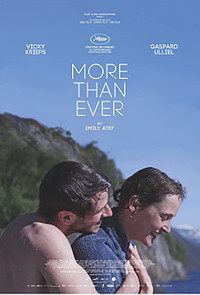 dir Emily Atef prd Xenia Maingot scr Emily Atef, Lars Hubrich with Vicky Krieps, Gaspard Ulliel, Bjorn Floberg, Sophie Langevin, Valerie Bodson, Jeremy Barbier d'Hiver, Marion Cadeau, Yacine Sif El Islam, Estelle Kerkor, Nathalie Man, Baptiste Girard, Tom Linton release US Oct.22 hiff, Fr 16.Nov.22, UK 20.Jan.23 22/France 2h03 CANNES FILM FEST  Is it streaming? |
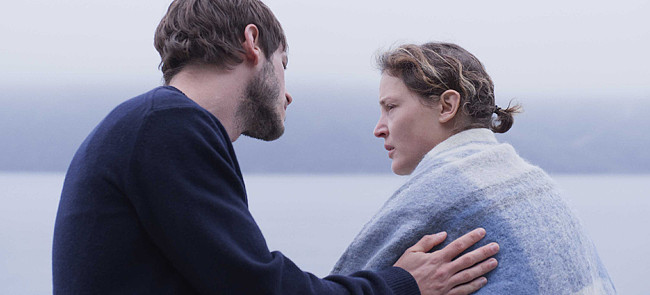 Soulful and moving, this drama set in France and Norway grapples knowingly and subtly with enormous questions about mortality and self-determination. And as it mixes French and Scandinavian moodiness, it's also rather long and gloomy. But filmmaker Emily Atef maintains an involving internalised perspective that allows the audience to take an emotional journey with central characters who are beautifully played by Vicky Krieps and the late Gaspard Ulliel. In Bordeaux, Helene (Krieps) hates how everyone treats her differently after she is diagnosed with a fatal lung condition. Even her devoted husband Matthieu (Ulliel) is sometimes a bit too protective of her. Trying to make sense of her feelings, she reads a cancer patient's online blog and decides she wants to travel on her own to meet him in rural Norway. While Bent (Floberg) is not who he seemed to be, his aloof manor and painful past help Helene clear her head. So when Matthieu joins her, he struggles to understand her thought process. As Bent observes, it's not possible for the living to understand the dying. The film explores this idea with remarkable sensitivity, allowing much of the story to take place between the lines. Helene's odyssey takes her deep into herself via the connections she has to both her deeply loving husband and this new father figure. And the spectacular landscape of the fjord around Bent's home has perhaps an even deeper impact on her. The filmmaking approach requires actors to dig deeply into their characters' physical and emotional reactions. Krieps finds wonderful resonance in Helene's emotionality, radiating curiosity and intelligence as she fights to understand conflicting feelings. Even when they clash, Krieps and Ulliel convey this couple's tenacious bond. So moments of intimacy carry an unusually honest kick. And the offbeat interaction between Krieps and Floberg is also moving, simply because of what doesn't need to be said. Atef depicts Helene's experience from the inside out as she strains to make sense of the clashing thoughts swirling inside of her. So contradictions are allowed to exist, and even help push the film forward. She loves Matthieu with her heart, soul and body, and yet needs to be away from him at this point in her life, even though that causes pain for both of them. These kinds of dark emotions make the film feel rather morose and bleak at times, but it's also an unusually truthful way to tell a story.
| ||||
|
The Substitute El Suplente Review by Rich Cline | 
| |||||
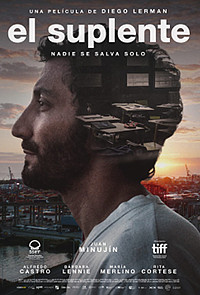 dir Diego Lerman prd Nicolas Avruj, Diego Lerman scr Diego Lerman, Maria Meira, Luciana De Mello with Juan Minujin, Alfredo Castro, Barbara Lennie, Lucas Arrua, Maria Merlino, Renata Lerman, Rita Cortese release Arg 20.Oct.22, US Oct.22 ciff, UK 20.Jan.23 22/Argentina 1h52 TORONTO FILM FEST Now streaming... |
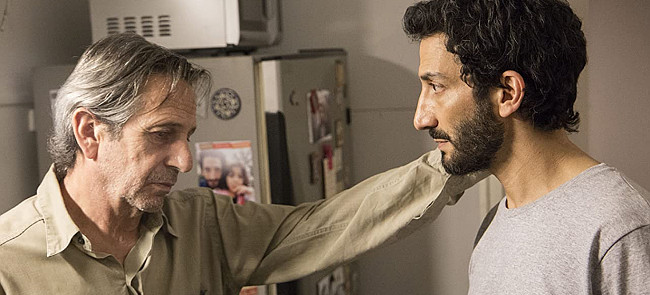 Bristling with real-world energy, this intensely personal drama from Argentina is inventively shot in an artful style that heightens a documentary sense of realism. The camera closely follows a teacher who gets involved with students in a rough part of town. The plot's wrinkles and connections feel more than a little predictable and tidy, but director Diego Lerman keeps the tone grounded and authentic, which makes it riveting. Recently divorced, Lucio (Minujin) shares custody of his stubborn 12-year-old daughter Sol (Lerman) with his ex Mariela (Lennie). In this Buenos Aires suburb, he's known as the son of "The Chilean" Roberto (Castro), whose work to help poor families places him between local mobster El Perro and the corrupt mayor. Substitute teaching literature in a rough high school, Lucio discovers that 16-year-old student Dilan (Arrua), who works with Roberto, is in trouble with El Perro. Suddenly armed officials are crawling all over the school, as the mayor uses drug-dealer panic to boost his re-election campaign. After the film's detailed scene-setting, the arrival of a number of ominous plot points is jarring, including Dilan's involvement in selling drugs, Roberto's serious illness and Sol's resistance to parental pressure. Plus constant menace from El Perro. At least Lerman never turns this into a full melodrama or thriller. Instead, he generates subtle emotion and suspense shot in a fly-on-the-wall style that inventively uses glass, mirrors and obstacles to elicit feelings from the viewer, even as scenes remain almost unnervingly realistic. Naturalistic performances match the filmmaking style. The camera remains close to Minujin, a likeable, empathetic figure whose decisions are gripping. The actor skilfully balances Lucio's feelings as he faces issues with his father, daughter and Dilan. All of these scenes are played with sensitivity and insight that transcends the way the script heaps so much on him at the same time. But he builds terrific connections along the way, including in underwritten subplots relating to Mariela and a fellow teacher (Merlino) who knows the neighbourhood. Cinematographer Wojciech Staron adds clever counterpoints to each scene, and Lerman directs everything with an earthy realism that showcases Argentine working class life that is rarely depicted on-screen. This makes the narrative structure eerily obvious, as various momentous situations build around Lucio at the same time, climaxing in a series of scenes that refreshingly avoid the usual overwrought angst or action mayhem. Instead, he is forced to plot his way through all of this in a way that's easy for us to identify with him.
| ||||

See also: SHADOWS FILM FESTIVAL © 2023 by Rich Cline, Shadows
on the Wall
HOME | REVIEWS | NEWS | FESTIVAL | AWARDS
| Q&A | ABOUT | TALKBACK | | ||||
